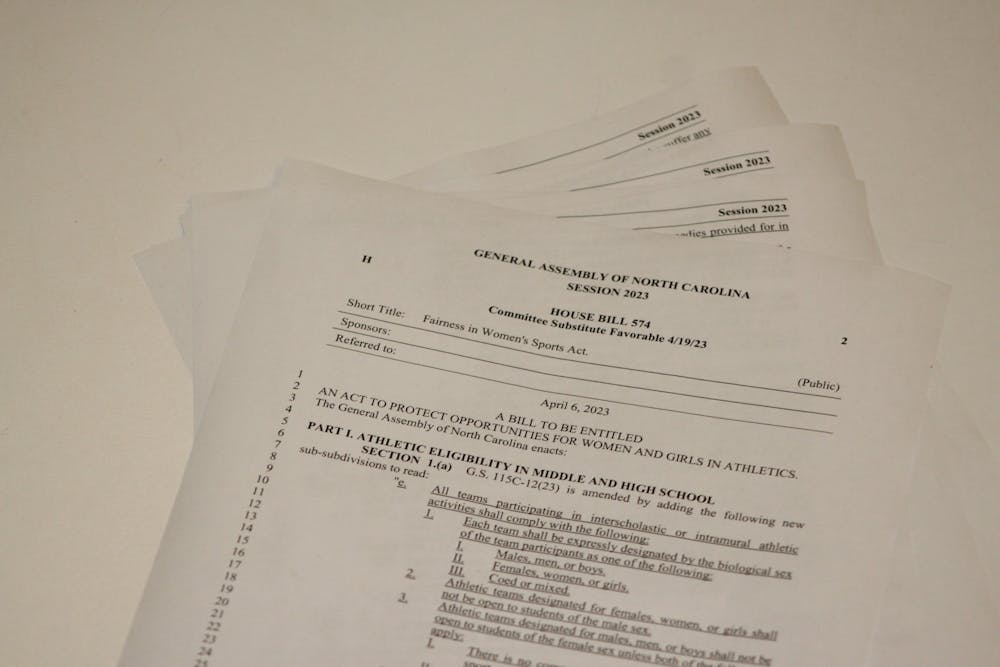Losing time with his teammates and friends hurt Radek, leading to him facing significant mental health challenges. Now, he worries about what this bill would do for other trans youth.
Speaking on behalf of Time Out Youth — an organization Radek is a part of that provides a community for those in the LGBTQ+ community — Radek argued in front of the N.C. General Assembly on April 19 that the new bills are “less about protection and safety, and more about control.”
Sponsors of the legislation have argued that the bill will promote fairness among athletes and ensure that safety measures are properly observed. Several sponsors of the bill, including N.C. Reps. Jennifer Balkcom (R-Henderson), Erin Paré (R-Wake) and Kristen Baker (R-Cabarrus) did not respond to requests for comments regarding the bill and its implications.
In May 2019, the Board of Directors for the North Carolina High School Athletic Association established a policy letting students participate on a sports team that aligns with their gender identity – even if it is different from what is listed on their birth certificate.
This bill would override the NCHSAA's policy protecting trans youth's ability to participate on the sports team corresponding to their gender identity.
Allison Scott, the director of impact and innovation at the Campaign for Southern Equality, has been an advocate for inclusivity in multiple facets – including working with the White House and Departments of Justice and Education on policy and legal issues surrounding trans rights. According to Scott, although the bill has not yet been implemented, it is already having a substantial impact on trans youth.
“They understand that it's saying, 'Hey, we don't want you to be the authentic you, we want you to pretend to be something else,’” Scott said.
N.C. Rep. Allen Buansi (D-Orange) voted against the bill and said depriving trans youth of the opportunity to participate in sports will cause harm.
“One of the great things about participation in athletics is that it's a part of teaching young people so many lessons about leadership and what it means to play on a team to sacrifice for one common goal," Buansi said. "For an opportunity like this to be deprived from trans students would just be so damaging mentally, emotionally speaking."
Scott said this initiative puts trans youth at risk of being outed.
"What happens to Joey if he's removed from the baseball team tomorrow?" Scott said. "And now everybody knows that Joey was trans so that's even their personal, individual health and medical information that they wouldn't want people to know out in the open.”
N.C. Rep. Vernetta Alston (D-Durham) said she worries about the greater message of anti-LGBTQ+ rights that the move could send to students.
To get the day's news and headlines in your inbox each morning, sign up for our email newsletters.
"That is, in and of itself, devastating," Alston said. "I think it sends a terrible message to all students. And I think it's, again, it's part of a larger effort to attack trans people and LGBTQ people."
Now, both chambers must pass the same version before it sits on Gov. Roy Cooper's desk. If the bill is vetoed, it will return to the General Assembly — where Republicans have a supermajority after N.C. Rep. Tricia Cotham (R-Mecklenberg) changed her party affiliation — for a potential veto override.
"We're excluding a whole community from doing something that every child should have the opportunity to do, and that will impact their physical health and mental health,” Radek said. “My situation is not going to be uncommon after these bills are in place. Almost every child who is trans and who wants to play sports, basically can't anymore."
@sydneybeyer | @dthsports
sports@dailytarheel.com




